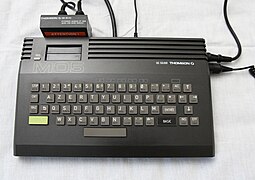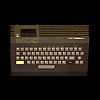Thomson computers

In the 1980s the French Thomson company produced a range of 8-bit computers based on the 6809E CPU.[1]
They were released in several variations (mostly concerning the keyboard or color of the casing) covering the MO and TO series[2] from late 1982 to 1989. While MO and TO models are incompatible in software, most of the peripherals and hardware were compatible.
These machines were common in France due to the 1980s governmental educational program Computing for All (Informatique pour Tous).[3][4][5] Around 100,000 MO5 and TO7/70 computers were ordered and installed in schools.[6] Export attempts to Germany, Italy, Algeria, USSR, India, Argentina and Spain were unsuccessful.
It is reported that there were 450,000 Thomson computers in France in 1986.[7] By 1988 Thomson had only sold 60,000 of the predicted 150,000 computers, abandoning computer development the following year.[6]
About 84 games were released for the TO7,[8][9] 194 for the MO5,[10][11] 3 for the TO7/70,[12] 10 for the TO9,[13] 21 for the MO6,[14][15] and 128 for the TO8.[16][17] Most titles were released between 1984 and 1987 and by French companies such as Infogrames, Loriciel, FIL or Coktel Vision.[18][19]
First generation
[edit]- Thomson TO7: produced from 1982 to 1984. Supplied with 24K RAM (16K used by the video) and upgradable to 48K. 8 color display.[20]
- Thomson MO5: released in 1984[21] in order to honor the Computing for All (Informatique pour Tous) plan.[22] Supplied with 48K RAM (32K available to user in BASIC 1.0) and first released with a rubber keyboard. Later it featured a mechanical keyboard. It was edited in a limited edition with a white casing, named "MO5 Michel Platini".
- Thomson TO7/70: 1984 version with more RAM (64K, upgradable into 128K) and 16 color display.[23]
- Thomson MO5E: 1985 export version, with a different casing featuring a mechanical keyboard, a parallel port, two joystick ports, an internal PAL modulator and an integrated power supply.[24]
-
Thomson MO5
-
Thomson MO5 "Michel Platini" edition
-
Thomson TO7
-
Thomson TO7-70
Second generation
[edit]- Thomson TO9 : released in late 1985. Separate keyboard and central unit, 128K RAM and a 3½-inch floppy disk drive.[25]
- Thomson MO5NR: released in 1985-1986. This is a MO6 in a MO5E casing, with an integrated network interface controller, the nanoréseau (nano network), which was used in French schools.[26][5]
- Thomson TO16 (prototype) called Theodore (TO d'or): 5 prototypes developed in 1985-1988. Based on a MC-68000 at 8 MHz and a rather good graphic card.[27][28][29]
- Thomson MO6 : released in 1986. 128K RAM and built in tape recorder.[30] Sold in Italy as the Olivetti Prodest PC128.[31]
- Thomson TO8 : released in late 1986. 256K RAM, 80K ROM with Microsoft BASIC 512, extra video modes.[32]
- Thomson TO9+ : released in late 1986, Separate keyboard and central unit, 512K RAM with a built in modem and a 3½-inch floppy disk drive.[33]
- Thomson TO8D : released in late 1987, it was a TO8 with a 3½-inch floppy disk drive.[34]
-
Thomson TO9
-
Thomson MO6
-
Thomson TO9+
-
Thomson TO8D
Unix systems
[edit]The Micromega was fundamental on the adoption of Unix by the French government, due to the localization of the Unix operating system. According to Dominique Maisonneuve, a Unix developer at CERG (Paris): "It was thanks to the Micromega that the government became interested in installing Unix. What was needed, was some hardware with a French coloring."[35]
- Micromega 32: released in 1982, it was a Motorola 68000-based machine running Version 7 Unix,[36][37][38][39][40] based on the Fortune 32:16, developed by Fortune Systems Corporation.[41][37][42][43][44][45][46][47] It had a 68000 CPU clocked at 5.5 MHz and 256KB of RAM, expandable to 1MB.[37] The display was monochrome and text based. An optional card enabled pixel graphics with a resolution of 800x480. Another expansion card added a Zilog Z80 CPU enabling the machine to run CP/M. External floppy drives or hard disks (with sizes up to 20MB) could be connected. The RS232 port could be used for network connection. The machine was presented to the public at the 1982 Salon des industries et du commerce de bureau (SICOB) in the Paris Expo Porte de Versailles.[38][48] Aimed at business[49][50] and government departments,[51][52] it was used in French hospitals,[53][54][55] embassies[56] and scientific research.[57][58][59][60][61][62] It was also sold in the Middle East[63] and Algeria.[64]
- Micromega 32000: A 1986 Alcatel branded machine with a tower layout, supporting Unix SV. The CPU is a 68020 at 16.5 MHz (68881 optional) with 1 to 4 MB of RAM. It features a 70MB hard drive, supports QIC-24 cartridges and offers Arcnet network connection.[65][66]
- Micromega PC: a 1986 workstation supporting Unix and MS-DOS, and developed based on the PC 7000 XP.[65]
- Micromega SX and Micromega SX/T - These machines have a similar box but with a different floppy drive location. The CPU is a 68000 at 11 MHz and RAM is expandable to 2 MB. It supports 45 and 70 MB hard drives and QIC-11 cartridges on the SX/T.
PC compatible
[edit]- Micromega 16: released in 1983, it was an IBM PC compatible machine, similar to the Eagle PC developed in 1982 by Columbia Data Products.[67]
- Thomson TO16 : released in September 1987. Intel 8088 based IBM compatible PC.[68]
See also
[edit]- Microsoft BASIC 1.0 - A version of BASIC used on Thomson computers
- Thomson EF936x - graphic chip used on Thomson computers
- Computing for All, a French government plan to introduce computers to the country's pupils
References
[edit]- ^ "OLD-COMPUTERS.COM : The Museum - Thomson". Archived from the original on 25 February 2021.
- ^ Thomson 8-bit computer emulation with MESS
- ^ Ina.fr, Institut National de l’Audiovisuel-. "Plan informatique : conférence de presse Fabius". Ina.fr.
- ^ "Près du radiateur...l'ordinateur !". Les Echos. October 2, 1991.
- ^ a b "Le Nanoréseau". sites.google.com. Retrieved 2022-11-08.
- ^ a b "Thomson". www.obsolete-tears.com.
- ^ "THOMSON JOUE LES LAPINS" (PDF). Hebdogiciel Magazine (150). August 29, 1986.
- ^ "Thomson TO7 video games (Hardware entity)". Universal Videogame List. Retrieved 2023-01-01.
- ^ "Listing of all Thomson TO7 games - Page 1". The Video Games Museum. Retrieved 2023-01-01.
- ^ "Thomson MO5 video games (Hardware entity)". Universal Videogame List. Retrieved 2023-01-01.
- ^ "Listing of all Thomson MO5 games - Page 1". The Video Games Museum. Retrieved 2023-01-01.
- ^ "Thomson TO7/70 video games (Hardware entity)". Universal Videogame List. Retrieved 2023-01-01.
- ^ "Thomson TO9 video games (Hardware entity)". Universal Videogame List. Retrieved 2023-01-01.
- ^ "Thomson MO6 video games (Hardware entity)". Universal Videogame List. Retrieved 2023-01-01.
- ^ "Listing of all Thomson MO6 games - Page 1". The Video Games Museum. Retrieved 2023-01-01.
- ^ "Thomson TO8 video games (Hardware entity)". Universal Videogame List. Retrieved 2023-01-01.
- ^ "Listing of all Thomson TO8 games - Page 1". The Video Games Museum. Retrieved 2023-01-01.
- ^ "Thomson - Releases per year". Universal Videogame List. Retrieved 2023-01-01.
- ^ "Thomson - Most common companies". Universal Videogame List. Retrieved 2023-01-01.
- ^ "Thomson TO7". www.obsolete-tears.com.
- ^ Thomson MO5 MESS driver
- ^ Wolf, Mark J. P. (May 27, 2015). Video Games Around the World. MIT Press. ISBN 9780262527163 – via Google Books.
- ^ Thomson TO7/70 MESS driver
- ^ "OLD-COMPUTERS.COM : The Museum". www.old-computers.com.
- ^ "Thomson TO9". www.obsolete-tears.com.
- ^ "Thomson MO5NR MESS driver". Archived from the original on 2021-06-05.
- ^ "Spécification du chip graphique Intel i82716 utilisée dans le prototype TO16". logicielsmoto.com.
- ^ "Thomson 16 bits - forum.system-cfg.com". forum.system-cfg.com.
- ^ "Thomson TO16". forum.system-cfg.com.
- ^ Thomson MO6 MESS driver
- ^ "Thomson MO6". www.old-computers.com.
- ^ Thomson TO8 MESS driver
- ^ "Thomson TO9+". December 27, 2020.
- ^ "OLD-COMPUTERS.COM : The Museum". www.old-computers.com.
- ^ "International – "Multi-user micro systems running on Unix are ideally suited for decision support applications."" (PDF). Datamation: 88–4. July 1985.
- ^ "OLD-COMPUTERS.COM : The Museum - Thomson Micromega32". www.old-computers.com.
- ^ a b c "Thomson Micromega 32". www.silicium.org. Retrieved 2022-11-30.
- ^ a b "Thomson Micromega 32". www.system-cfg.com. Retrieved 2022-11-30.
- ^ Holmes, Lewis (May 1982). "Hanover: power and electronics fare". Electronics & Power. 28 (5): 368. doi:10.1049/ep.1982.0189.
- ^ Etheridge, James (March 1984). "FOREIGN VENTURES: FOREIGN VENTURES - TWO FOR THE ROAD" (PDF). Datamation (84): 115.
- ^ "32:16 Fortune". www.old-computers.com. Retrieved 2022-11-30.
- ^ "Fortune advert: Fortune 32:16 - Minicomputer Performance at Microcomputer Price". nosher.net. Retrieved 2022-11-30.
- ^ "Fortune Systems". Rare & Old Computers. 2016-06-05. Retrieved 2022-11-30.
- ^ Enterprise, I. D. G. (1984-02-20). Computerworld. IDG Enterprise.
- ^ "Fortune 32:16 - System Details. The Freeman PC Museum... Largest Collection of Vintage Computers On The Web". www.thepcmuseum.net. Retrieved 2022-12-01.
- ^ "Fortune 32:16 - The Personal Computer Museum, Brantford, Ontario, CANADA - Recycle, donate, and browse your old computers, electronics, video games, and software". 2020-01-03. Archived from the original on 2020-01-03. Retrieved 2022-12-01.
- ^ Kowalezyk, R.; Morgant, G.; Baumann, F. C.; Giboudeau, J. (October–December 1986). "Biochemical laboratory management with a microcomputer" (PDF). Journal of Automatic Chemistry. 8 (4): 211–214. doi:10.1155/S146392468600041X. PMC 2547677. PMID 18925140.
- ^ The Seybold Report on Office Systems. Seybold Publications. 1982.
- ^ "Ordinateurs". Le Devoir. 8 December 1982. p. 20.
- ^ Notes et études documentaires (in French). La Documentation Française. 1988.
- ^ Les Cahiers de l'urbanisme (in French). Inspection générale de l'aménagement du territoire de la Région wallonne. 1988. ISBN 978-2-87009-337-5.
- ^ Revue générale des routes et des aérodromes: RGRA (in French). 1986.
- ^ Billault, B.; Degoulet, P.; Devriès, C.; Aimé, F.; Attali, J. R.; Tchobroutsky, G.; Cathelineau, G.; Passa, P. (April 1987). "[A computerized file for the surveillance of diabetic patients: the MELLITEE system]". Diabète & Métabolisme. 13 (2): 129–134. ISSN 0338-1684. PMID 3595968.
- ^ Zimmermann, Marc; Maisonblanche, Pierre; Cauchemez, Bruno; Leclercq, Jean-François; Coumel, Philippe (1 June 1986). "Determinants of the spontaneous ectopic activity in repetitive monomorphic idiopathic ventricular tachycardia". Journal of the American College of Cardiology. 7 (6): 1219–1227. doi:10.1016/S0735-1097(86)80139-5. ISSN 0735-1097. PMID 2423570. S2CID 34476345.
- ^ Roger, F. H.; Grönroos, P.; Tervo-Pellikka, R.; O'Moore, R. (6 December 2012). Medical Informatics Europe 85: Proceedings, Helsinki, Finland August 25–29, 1985. Springer Science & Business Media. ISBN 978-3-642-93295-3.
- ^ "OLD-COMPUTERS.COM : The Museum – Thomson Micromega32". www.old-computers.com.
- ^ Medieval Prosopography. Medieval Institute Publications, Western Michigan University. 1988.
- ^ Kimberley, Robert (1990). Text Retrieval: A Directory of Software. Gower. ISBN 978-0-566-03642-2.
- ^ McCrank, Lawrence J. (1989). Databases in the Humanities and Social Sciences, 4: Proceedings of the International Conference on Databases in the Humanities and Social Sciences Held at Auburn University at Montgomery, July, 1987. Learned Information. ISBN 978-0-938734-37-6.
- ^ Corti, Laura (1988). SN/G Report on Data Processing Projects in Art: Projects. Scuola normale superiore.
- ^ Jouannet, Francis; Bonetto, Ch (1987). Modèle informatisé du traitement des tons: domaine bantou (in French). Peeters Publishers. ISBN 978-2-85297-204-9.
- ^ Bornes, Christian (1984). Les nouvelles technologies dans l'information scientifique et technique: cours INRIA (in French). INRIA. ISBN 978-2-7261-0405-7.
- ^ Middle East Computing. Reed Business Publishing Developments, a division of Business Press International,300. 1985.
- ^ Marchés tropicaux et méditerranéens (in French). Rene Moreaux et Cie. 1989.
- ^ a b "Micro Systèmes n°75 mai 1987 - Page 32 - 33 - Micro Systèmes n°75 mai 1987 - Micro Systèmes - informatique grand public - informatique et réseaux - Sciences et Techniques - 1001mags - Magazines en PDF à 1 € et GRATUITS !". fr.1001mags.com. Retrieved 2022-12-01.
- ^ "INFORMATIQUE (01) no:935 15/12/1986 | Musée de la presse". museedelapresse.com. Retrieved 2022-12-01.
- ^ "Thomson Micromega 16". www.silicium.org. Retrieved 2022-12-01.
- ^ "Thomson - TO16 PC". www.system-cfg.com.









